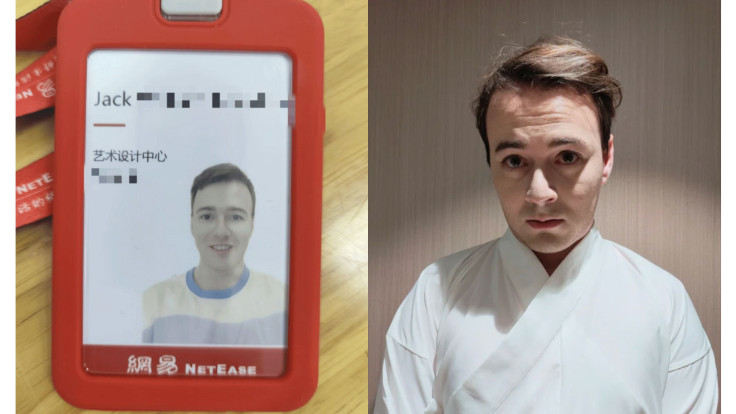British Man, Laid Off From Chinese Tech Company, Barely Survives Brutal '996' Work Culture Endorsed By Jack Ma
Chinese business magnate Jack Ma argues that the 996 culture is necessary for success

Oct. 7: This article and headline has been updated to accurately depict Jack Ma's stance on '996' work culture and to correct Jack Forsdike's work timeline.
A 28-year-old British expat from Manchester, Jack Forsdike, recently shared his experience of enduring China's notorious "996" work culture during his two-year stint at a tech company in Guangzhou. The term "996" refers to working from 9 a.m. to 9 p.m., six days a week—an intense schedule widely endorsed by Chinese business magnates like Jack Ma, founder of Alibaba. Forsdike's journey under this relentless work regime ended abruptly when he was laid off, leaving him with mixed feelings of disappointment and relief.
Thrilled at First, But Reality Sets In
When Forsdike first moved to China, he was eager to embrace its booming tech industry and challenging work culture. He was initially employed as an English-Chinese interpreter in 2022, Forsdike followed an exhausting but traditional nine-to-five schedule. However, in January 2024, his company offered him a new role as a game developer, which came with the gruelling 996 hours. Human resources warned him about the significant increase in his workload, but Forsdike saw it as a sign that he was being recognised as a valuable part of the company.
"I felt honoured," Forsdike said, "like my productivity and skills were being noticed. I believed this was my chance to prove myself."
What started as excitement soon turned into exhaustion. Despite negotiating some flexibility with his manager—such as leaving early on certain days and avoiding work on Saturdays—Forsdike found himself fully engulfed in the 996 schedule within months. His workload was overwhelming, often forcing him to work through weekends and leave the office close to midnight.
The Strain of 996: Burnout Hits
"I quickly realised how naive I was," Forsdike admitted, as the toll of working 12-hour days became apparent. His personal life deteriorated. As a newlywed, he barely had time to spend with his wife and had to give up his hobbies, including tennis and exercising. The company's canteen became his primary source of meals, and even simple pleasures like dining out became rare luxuries.
Forsdike's health began to suffer as the lack of balance took its toll. "I started gaining weight, losing muscle, and feeling mentally drained," he shared. Despite this, he persevered, hoping the pressure would eventually ease.
The breaking point came in April 2024, during a "crunch" period—a common term in the gaming industry for a final push of intense, unpaid overtime before a major release. Forsdike's team was tasked with meeting a critical deadline, and the hours became even more extreme. Forsdike worked 12 to 14-hour shifts for three consecutive weeks with no days off.
"The stress was unbearable," he recalled. "We were constantly being pushed to meet impossible deadlines, and even on Sundays, many of my colleagues were still in the office."
Laid Off After Two Years of Gruelling Work
Despite enduring months of exhausting work, Forsdike was laid off in May 2024, shortly after returning from a brief break during Labour Day, a significant holiday in China. His team, nearing the completion of their project, was informed that the company had decided to scale back development efforts, leading to widespread layoffs.
"I was devastated but also relieved," Forsdike confessed. "The 996 culture made me realise how much I had sacrificed in my personal life. Losing my job felt like an opportunity to reset and rethink my priorities."
Jack Ma's Endorsement of 996 Sparks Debate
Despite mounting criticism, Jack Ma, one of China's most prominent business leaders, has long supported the 996 work culture. In 2019, Ma publicly endorsed the gruelling schedule, describing it as a "blessing" for passionate employees. According to CNN, Ma stated, "If you find something you love, 996 is not a problem. If you don't, every minute is torture."
Ma's endorsement of the 996 work culture has faced backlash from employees and Chinese state media. Critics argue that the practice exploits workers, leaving little room for personal life and well-being. In a social media post on Weibo, a user called out Ma, saying, "Did you ever think about the elderly at home who need care or the children who need company?" (CNN). Others have pointed out the long-term consequences of such extreme working conditions, including burnout and declining mental health.
While Ma maintains that hard work is essential for success, many argue that the 996 mindset is outdated and harms employee morale and productivity. Forsdike's story is a testament to the challenges workers face in China's tech industry, where long hours are often equated with dedication.
A Call for Change
Forsdike is now urging senior managers in the tech industry to reconsider the 996 culture. He believes the relentless work schedule crushes employee morale and decreases productivity, as overworked teams are more prone to mistakes. "It's not sustainable," he said. "The 996 culture might seem like a way to push employees harder, but in the long run, it just burns people out."
Despite his struggles, Forsdike recognises that the pressure to work long hours is not unique to China. Tesla co-founder Elon Musk has previously admitted to working up to 120 hours a week during production delays, famously tweeting, "There are way easier places to work, but nobody ever changed the world on 40 hours a week."
However, Forsdike believes that the tech industry needs to strike a better balance between work and personal life. "We need to move away from glorifying long hours and start valuing our health and well-being," he argued.
© Copyright IBTimes 2025. All rights reserved.






















